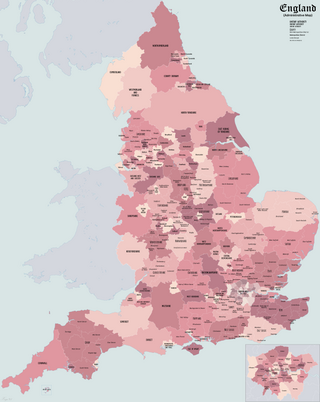Related Research Articles

The subdivisions of England constitute a hierarchy of administrative divisions and non-administrative ceremonial areas.

Local government in England broadly consists of three layers: civil parishes, local authorities, and regional authorities. Every part of England is governed by at least one local authority, but parish councils and regional authorities do not exist everywhere. In addition, there are 31 police and crime commissioners, four police, fire and crime commissioners, and ten national park authorities with local government responsibilities. Local government is not standardised across the country, with the last comprehensive reform taking place in 1974.

The regional chambers of England were a group of indirectly elected regional bodies that were created by the provisions of the Regional Development Agencies Act 1998. There were eight regional chambers, one for each of the regions of England except Greater London, which had opted for an elected mayor and assembly in 1998. All eight regional chambers had adopted the title "regional assembly" or "assembly" as part of their name, though this was not an official status in law. The chambers were abolished over a two-year period between 31 March 2008 and 31 March 2010 and some of their functions were assumed by newly established local authority leaders' boards.

Birmingham, a city and metropolitan borough in the West Midlands, England, is the second-largest city in the United Kingdom.

Southampton City Council is the local authority of the city of Southampton. It is a unitary authority, having the powers of a non-metropolitan county and district council combined. It provides a full range of local government services including council tax billing, libraries, social services, processing planning applications, waste collection and disposal, and it is a local education authority. The council uses a leader and cabinet structure. Labour has been in control of the council since 2022.

In the United Kingdom, regional development agencies (RDAs) were nine non-departmental public bodies established for the purpose of development, primarily economic, of England's Government Office regions between 1998 and 2010. There was one RDA for each of the NUTS level 1 regions of England. Similar activities were carried out in Wales by the Welsh Government Department of Economy and Transport, in Northern Ireland by the Department of Enterprise, Trade and Investment and in Scotland by Scottish Enterprise and Highlands and Islands Enterprise.

The London Development Agency (LDA) was from July 2000 until 2012 the regional development agency for the London region in England. A functional body of the Greater London Authority, its purpose was to drive sustainable economic growth within London.

Peterborough City Council is the local authority for Peterborough in the East of England. It is a unitary authority, having the powers of a non-metropolitan county and district council combined. The City was incorporated as a municipal borough in 1874; from 1888, it fell within the jurisdiction of the Soke of Peterborough county council and from 1965, Huntingdon and Peterborough county council. In 1974, it was replaced by a wholly new non-metropolitan district, broadly corresponding to the Soke, in the new enlarged Cambridgeshire. In 1998, Peterborough became independent of Cambridgeshire as a unitary authority, but the city continues to form part of that county for ceremonial purposes as defined by the Lieutenancies Act 1997.

The North West Regional Assembly (NWRA) was the regional chamber for the North West England region of the England. It was based at Wigan, in Greater Manchester. It was abolished in July 2008.

The East of England Regional Assembly was the regional chamber for the East of England region of the England. It was based at Flempton, near Bury St Edmunds in Suffolk. The assembly was created as a voluntary regional chamber in 1998 by the Regional Development Agencies Act 1998. The first meeting was held in March 1999. In July 2003 the assembly was reconstituted to combine its existing functions with those of the regional arm of the Local Government Association and of the Regional Employers Organisation. The assembly was abolished on 31 March 2010, its functions transferring to the newly constituted East of England Local Government Association.

The East Midlands Regional Assembly was the regional chamber for the East Midlands region of the England. It was based at Melton.
The West Midlands Regional Assembly (WMRA) was the regional chamber for the West Midlands region of England, established in 1999. It was based in Birmingham. It was abolished on 31 March 2010, its functions transferring to West Midlands Leaders Board and to Advantage West Midlands.

The South West Regional Assembly (SWRA) was the regional chamber for South West England, established in 1999. It was wound up in December 2008. Its functions were taken on by the Strategic Leaders' Board, the executive arm of the newly established South West Councils.
The history of local government in England is one of gradual change and evolution since the Middle Ages. England has never possessed a formal written constitution, with the result that modern administration is based on precedent, and is derived from administrative powers granted to older systems, such as that of the shires.

Local authority leaders' boards are voluntary regional associations of council leaders that have been established in England outside of Greater London to replace certain functions of the now abolished regional chambers. The establishment of the boards was part of the UK Government's Review of Sub-National Economic Development and Regeneration. which brought forward the Government's plans to alter the structure of regional governance in England and was mandated by the Local Democracy, Economic Development and Construction Act 2009. In June 2010, the new Conservative-LibDem coalition government announced plans to remove funding from the new boards and to remove their statutory functions. It was indicated that the boards might continue as voluntary associations of council leaders.
South East Councils (SEC) is a voluntary association of council leaders from the 74 local authorities in the South East region of England. It is a regional grouping of the Local Government Association. It was established following the abolition of the South East England Regional Assembly in March 2009. From April 2009 to 2010 it had a statutory role in regional planning.
East Midlands Councils is a consultative forum for local government in the East Midlands region of England. It is a regional grouping of the Local Government Association and the regional employers organisation.

The regions, formerly known as the government office regions, are the highest tier of sub-national division in England. They were established in 1994 and follow the 1974–96 county borders. They are a continuation of the former 1940s standard regions which followed the 1889–1974 administrative county borders. Between 1994 and 2011, all nine regions had partly devolved functions; they no longer fulfil this role, continuing to be used for limited statistical purposes.
The East of England Local Government Association (EELGA) is an association of the 52 local authorities in the East of England. It is a regional grouping of the Local Government Association and the regional employers organisation. It was established in April 2010 following the abolition of the East of England Regional Assembly.
In England, local enterprise partnerships (LEPs) are voluntary partnerships between local authorities and businesses, set up in 2011 by the Department for Business, Innovation and Skills to help determine local economic priorities and lead economic growth and job creation within the local area. They carry out some of the functions previously carried out by the regional development agencies which were abolished in March 2012. In certain areas, funding is received from the UK government via growth deals.